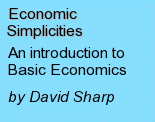




INTRODUCTION TO ECONOMICS
Lesson 11
Free Trade Zones [ Free Ports ]
The destruction of New Orleans in Louisiana by Hurricane Katrina has revived memories of the earlier hurricane disaster of 1900 which destroyed the port city of Galveston in neighbouring Texas. Galveston prior to its destruction had been somewhat of a boom city and appeared destined to become a major metropolis. However it never recovered from the disaster and today, in terms of its importance as a city, it is a shadow of its former self. Some pundits are predicting a similar fate for New Orleans. To try to prevent this, various remedies are being proposed. One is that New Orleans should become a Free Trade Zone ["FTZ"]. In 1852 New Orleans had been the third largest city in the USA. Although it has been in steady long-term decline for some time, prior to the hurricane it was still the second biggest port in the country.
WHAT'S A FREE TRADE ZONE
An area of a country demarcated for the purpose of attracting trade and creating employment by eliminating the operation of tariffs and regulation within the area. If fully implemented it amounts to the creation of a situation of 1 country 2 systems. Whilst its operation can be confined to trade alone it can be extended to include warehousing, assembling and even manufacturing, which if conducted within the zone are subjected to zero or much reduced taxes and regulations.
There are numerous FTZs throughout the world. Most are in third world or less developed countries, typically in the poorer parts of such countries. However they also exist in developed countries, including Australia.
The success of a FTZ depends on how well it is positioned to take advantage of such status including its location on a major trade route or proximity to a major market. More importantly however is how genuine is its operation as a free trade zone. If genuinely implemented and operated as such, experience suggests that FTZs generally achieve their purpose.
For obvious reasons FTZs are frequently established at or near ports and aerodromes. FTZs are to be distinguished from a variety of superficially similar schemes such as duty free shops, bonded warehouses, specifically targeted reduced tax and regulation agreements and tax and tariff rebates.
Duty free shops are a commonplace measure designed to stimulate the purchase in the host country of products otherwise available more cheaply outside the country. Tourists and residents leaving the country are accordingly encouraged to purchase in the host country rather than waiting until they are able to purchase more cheaply elsewhere.
Bonded warehouses enable importers, after posting a bond to cover the potential tariff on imported goods are able to store them in special warehouses. If the imported goods are then re-exported either with or without additional work having been performed on them at the warehouse, no duty is payable. This of course helps keep the price of such re-exported goods competitive on world markets.
Specifically targeted reduced tax and regulation agreements are aimed at particular businesses or companies which a government wishes for whatever reason to attract to its country. They are individual one-off deals.
Tax and tariff rebates are schemes designed to attract foreign tourists. When making a purchase within a country, which applies sales or similar taxes, foreign tourists can present their passports and international travel tickets and be given a voucher for the amount of the tax. This can then be redeemed at the port aerodrome or other place of departure from the country in cash or by cheque.
Some Examples
Greece-
Freeports of Pireus and Thessaloniki
Malaysia- Penang
Germany Freeports of Hamburg and Bremen
Bermuda Freeport of Hamilton Harbour
Phillipines Subic Bay [former US naval base]
Panama Colon Free Zone
USA Minnesota Foreign Trade Zone [Minneapolis]
Ukraine Odessa Freeport
UK Liverpool Free Zone, Tilbury Free Zone, Isle of Man
UAE Dubai Free Zone
Ireland Shannon Free Zone
Australia Darwin Free Zone
SOME ARGUMENTS AGAINST FTZs
The very popularity of FTZs has empowered large multinational corporations, which are able to play off host countries to give them additional privileges to locate in a particular FTZ. This particular criticism is negated if in fact the FTZ applies the same rules for all and eschews government subsidies.
Foreign companies are given benefits denied ordinary citizens. This criticism likewise is negated if domestic firms are given the same rights to establish in the zone.
Existing businesses in the rest of the country trying to compete in exporting products are placed at a disadvantage thereby prejudicing the various regions in which they are located with reduced trade and employment.
Governments are deprived of tax revenue, which could otherwise be used as the government determined to benefit the country and the people.
The benefits of FTZs are enjoyed largely by foreign companies and businesses, which at the same time are spared from having to contribute taxes and regulatory benefits to the host government.
The absence of or reduction in regulations reduces or removes the safeguards and benefits otherwise available to workers within the zone. At the same time pressure is applied to workers in the rest of the country to accept the same conditions as those applying within the zone or otherwise risk their employers ceasing to operate in their existing location and relocate to the FTZ.
Proclaiming and permitting a part of the country to operate as a FTZ is to benefit that area and thereby discriminate against the rest of the country.